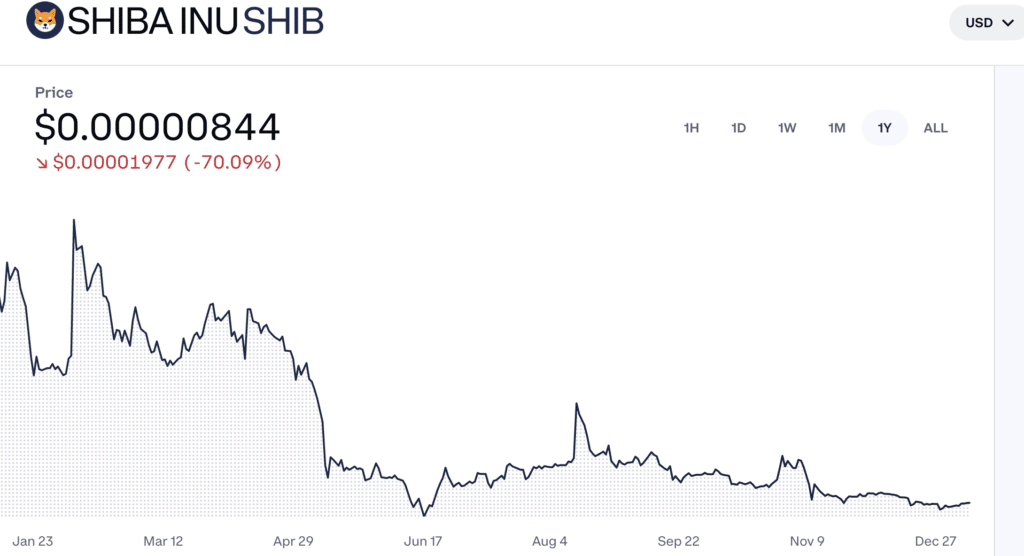Say that we want to speculate upon BONK – and speculate it would be of course – then we face something of a problem. For actual crypto exchanges seem to be falling over with depressing regularity. This then means that speculation on DOGE, or Shiba Inu (SHIB) – all things that might be connected – is also difficult. Not because we don’t know what speculation is, or because we can’t gain access to opportunities to do so. But rather, because we’ve worries about the base stability of the financial system we might use to do so.

It is, after all, not much use to be right about the direction of Solana while doing so within FTX. At least, not now it isn’t. And it also wasn’t that much good to have got it right but also to have been stuck inside FTX. There is a certain rather cynical view which is that having been wrong inside FTX also doesn’t matter now but it’s not certain that the legal system will leave that to be true for all time.
The problem here being that we face two entirely different risks. One is an instrument risk, the other is the platform risk. It’s worth understanding the differences between these two.

So, BONK, DOGE and SHIB – or if we prefer Bitcoin (BTC) itself – then prices do change. There’s no “business” there, no revenues, no yield, so calling it investment might not be quite the right description. But then that would also be true of any FX position. Speculation – which to economists is not a dirty word – or trading is appropriate perhaps. And it’s most certainly true that prices in this universe move, therefore trading and or speculation can both be done and profitable if done well. Unprofitable if not done well too – there’s always risk to account for.
OK, that’s instrument risk, or we might call it price risk. Prices change, we can profit from being on the right side of them, lose from not. What, actually, it is changing in price doesn’t really change that calculus.
But now we come to platform risk. When we trade shares, we generally do so on a stock exchange. True, of varying levels of security and formality, the LSE or NYSE is different from the OTC markets and they’re a step up from private equity. Bonds very quickly fall off into those OTC markets. But we also know that the exchanges themselves are going to survive. Really, just because no one is going to allow the NYSE or LSE to go down. Even if the company itself (and both are profit making companies) does implode, we’ll still be able to trade our shares. Or, even, we’ll still own them.
The problem we’ve got with crypto is this platform risk. We’re finding out that if – as – one of these exchanges like FTX goes down then it’s not necessarily true that we even own our assets, let alone our positions. With Celsius, they own most assets, not customers.
Heck, it’s difficult enough working out what to trade without finding out that you don’t even own your winnings. Or potentially don’t. Now, this is one of the things that those more formal exchanges already have sorted out. Stock may be traded on the NYSE, but it definitely belongs to the punter, not the NYSE.
OK, so now how do we gain that same protection from platform risk while still being able to trade crypto? That’s a problem as we’ve not got trading platforms that have that clear difference between customer and exchange assets. At least, not yet we don’t. Which is why we all think about the finances of Binance. Well, if we put assets in there, will we get them back?
The sad answer about crypto exchanges is that no one actually knows. No, really, no one does know. And yet we’d all like to be able to trade – if not speculate – upon those price changes. Which is something of a problem. The answer might well be trading in contracts for difference. This enables simply the speculation – for that’s what it is more than anything else – in the changes in price. Great.

There are still problems, of course. The solvency of the CFD broker is a point to consider. And yet on the other hand the CFD broker holds only our position. We’ve not, in fact, put in the full assets as we might have to do in a crypto exchange. That is, we can still win or lose on our price changes, but the underlying asset never is at risk of capture by the exchange.
The switch here is that there always is a switch. A CFD position is by its nature short term, unlike owning the underlying asset. But the more we worry about exchange solvency perhaps the more that’s a trade-off we’ll be happy with?